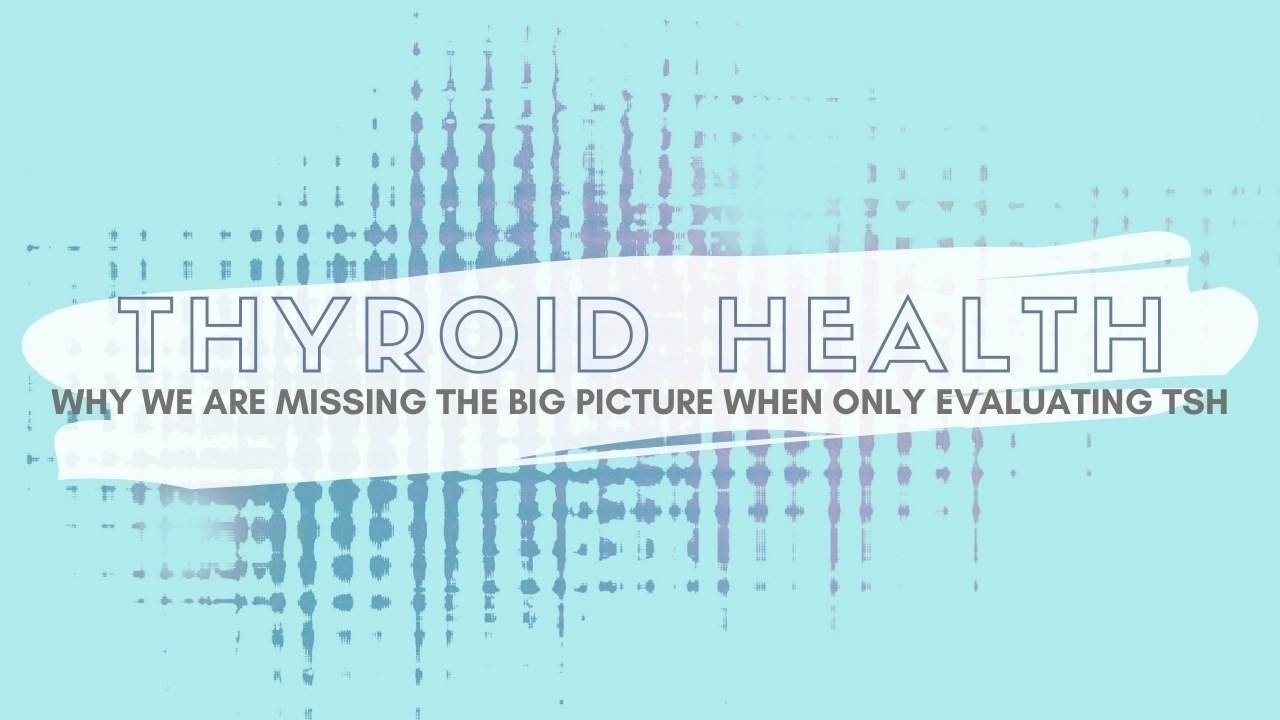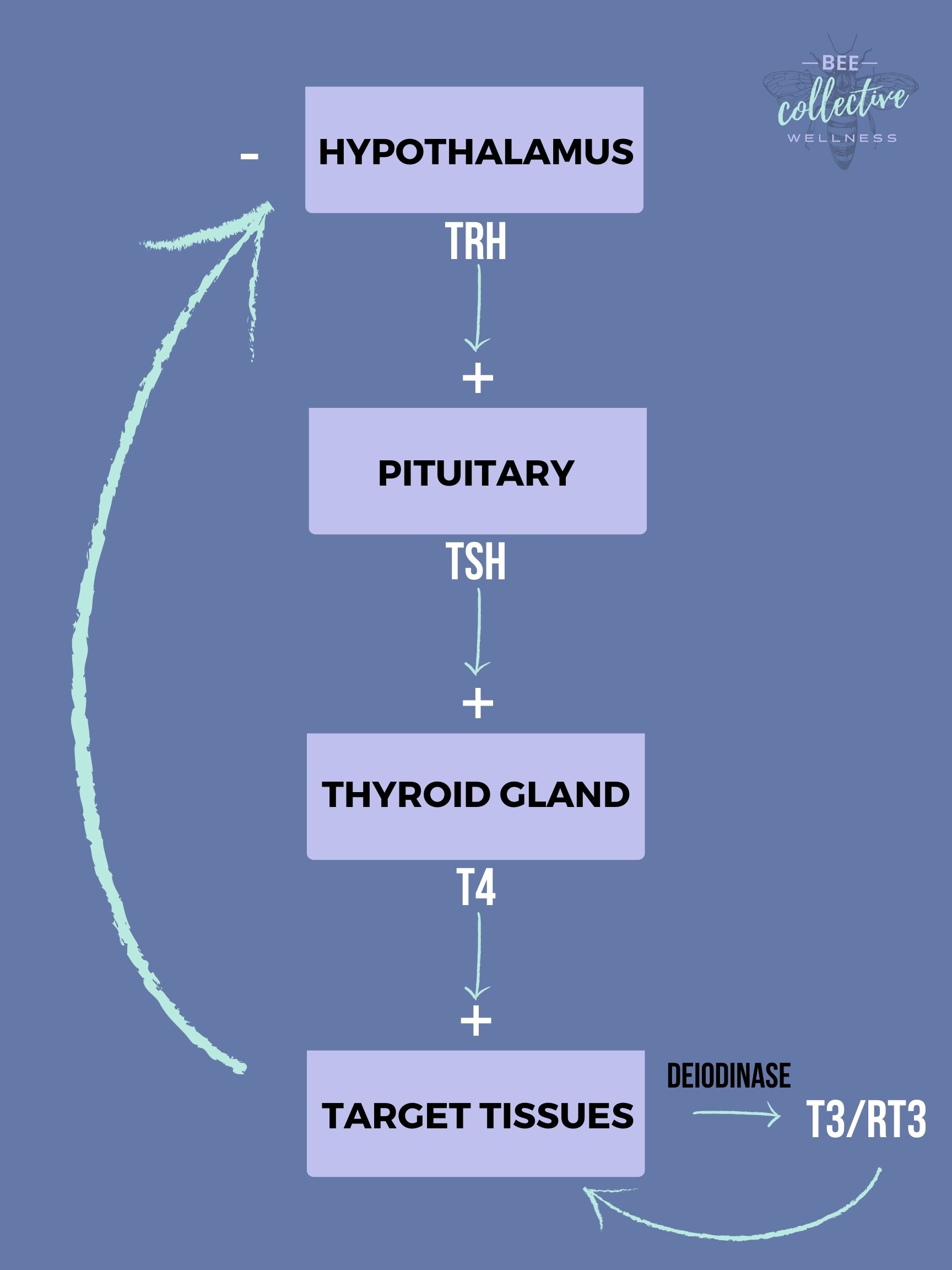
Understanding the Thyroid
Dec 27, 2020The American Thyroid Association estimates that more than 27 million Americans have thyroid disease but more than half are unaware of their condition.
The Thyroid Gland
Did you know that the thyroid gland is responsible for many of the metabolic processes in the body? It affects heart rate, metabolism, skin, hair and nails, temperature regulation, reproduction, and digestion. The American Thyroid Association estimates that more than 27 million Americans have thyroid disease but more than half are unaware of their condition. But why is that?? Unfortunately, most healthcare professionals are not evaluating all aspects of thyroid function. Frequently only a TSH level is evaluated which is a poor indicator of thyroid function. In fact, TSH is a better indication of pituitary function rather than thyroid function. Confused? Let me explain.
Hormone Creation
Hormones work on the negative feedback loop. The body will send a message to the hypothalamus that a certain hormone level is low. The hypothalamus then sends a message to the pituitary gland and the pituitary sends a message to the appropriate gland in the body to release that hormone. Once the levels come back into a suitable range, the hypothalamus turns off the message to the pituitary and the pituitary stops signaling to the gland. When levels drop, the cycle starts all over again. It’s really fascinating how our bodies work!
Thyroid Hormone Creation
There are two main thyroid hormones that we focus on when it comes to thyroid health - T4 and T3. About 80% of T4 and 20% of T3 is created by the thyroid. However, T3 is the most usable form of thyroid hormone and is actually four times more potent than T4. It’s the body’s responsibility to convert T4 to T3 by deiodinase enzyme reactions in the liver, gut, and brain. T3 impacts every cell and organ in the body and determines which proteins are created by cells by binding a cell’s DNA. Crazy huh!? T3 levels in the body are really what signals to the hypothalamus whether thyroid hormones need to be released.

Stress and the Thyroid
But of course, that’s in the perfect world where our body is humming along perfectly doing what it is supposed to do. This incredible vessel that we occupy is managing a lot of systems and, unfortunately, things don’t always work smoothly. We have things that influence the way our body operates like lifestyle, nutrition, and the environment we live in. Things can start to go array.
Let’s take stress, for instance. Stress can be physical or mental stress, trauma, caloric restriction, fasting, inflammation, toxin exposure, and/or infection (to name a few). Stress can have a cascade effect throughout the body. But specifically related to the thyroid, RT3 (reverse T3) steps in and incepts that conversion process by also sits on that T3 receptor site. RT3 can also be known as the hibernation hormone. When RT3 is high, you’ll see issues with weight and energy levels. RT3 sitting on the T3 receptor site and says “Hey! Hypothalamus and pituitary - We’re good here, we don’t need more T3!” So what happens? TSH levels come back down to normal and until the thyroid levels drop again. Meanwhile, you’re left struggling with low thyroid symptoms.
Thyroid Antibodies
Hashimoto’s thyroiditis and Graves’ disease are two autoimmune conditions associated with the thyroid. While Hashimoto’s is a condition related to hypothyroidism (and more common), Graves’ disease is a condition related to hyperthyroidism. Thyroid antibodies can also be created by the body. Thyroid antibodies view the thyroid as a threat or an invader and start attacking the thyroid gland or thyroid proteins. This causes inflammation which damages the tissues and thyroid function. As the thyroid gland is attacked, you can see big swings in T4 and T3 levels of normal ranges to abnormal ranges.
Symptoms Associated With Thyroid Issues
As with all symptoms, there needs to be a bit of detective work to figure out what exactly is happening. I am all for the testing, not guessing as we want to make sure that we are addressing the appropriate system associated with the symptoms.
Common symptoms associated with hypothyroidism (low thyroid function):
-
Irregular menstrual cycles
-
Weight gain
-
Cold intolerance or cold hands and feet-Depression or anxiety
-
Slow heart rate
-
Fatigue
-
Memory loss/brain fog
-
Thinning hair, brittle nails, dry skin
-
Constipation
Common symptoms associated with hyperthyroidism (overactive thyroid function):
-
Irregular menstrual cycles
-
Weight loss
-
Heat intolerance or excessive sweating
-
Anxiety
-
Fast heart rate
-
Insomnia
-
Hair loss
-
Loose stools
Comprehensive Thyroid Hormone Evaluation
So what am I getting at here? The thyroid needs to be evaluated on a comprehensive level. TSH alone does not give us a good snapshot of thyroid health. Even TSH and T4 alone do not give us the full picture as there could be an issue with the conversion of T4 to T3. If you’re experiencing symptoms of hypo- or hyper- thyroidism, you should request your provider draw a comprehensive panel.
A comprehensive panel includes:
-
TSH
-
T4 Total
-
Free T4
-
T3 Total
-
Free T3
-
Reverse T3
-
Anti-Thyroperoxidase (Anti-TPO)
-
Anti-Thyroglobulin Antibodies
A vitamin D and B12 deficiency are frequently observed with low thyroid hormones and should be considered for evaluation as well.
Just remember that you, as a patient, have the right to request whatever labs you want. Also know that insurance may not cover all of the labs evaluated. If your provider is reluctant, you can seek out a new provider that is willing to work with you.
The information available on this website is for general health information only and is not intended to be a substitute for professional medical advice, diagnosis or treatment. You should not rely exclusively on information provided on the Website for your health needs. You can read more about our disclaimer here.
Are you overwhelmed by all of the conflicting information regarding health, hormones, nutrition, and weight management?
Join me once a month for a FREE "Ask Me Anything" live Zoom sesh! I'll answer all the questions you've been spending so much time searching the internet for.









